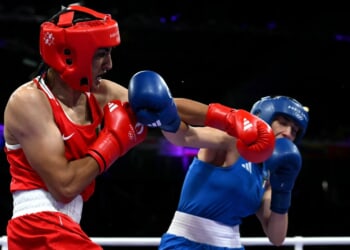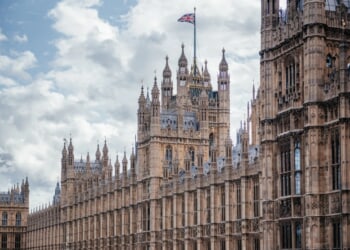Alexander Bowen is an MPP-MIA student at SciencesPo Paris and St Gallen specialising in public health, and a policy fellow at a British think tank.
Want to defeat Labour, why not join the Greens?
Now I am not advocating ecosocialism nor some throwback to 2006’s Vote Blue, Go Green, I am advocating what ought best be termed cooperative entryism.
Where normal entryism involves joining a party to sabotage it (say helping to elect a massively unpopular leader like Jeremy Corbyn), or spy on it, or to hijack selection procedures as advocated by Nick Clegg in his 2018 book “How to Stop Brexit” (readers will note in this case he was not shall we say successful), cooperative entryism is something else entirely.
It is joining a party with the purpose of making it stronger and in doing so making your own party stronger. The political equivalent of “the enemy of my enemy is my friend”. I am advocating that you join the Greens then for this very reason. Let me explain.
Historically, the Green electoral coalition has been two equal segments. What we could best term ecosocialists and conservationists (or as the Germans would term it realos and fundis); a coalition essentially between Bristol vegans and shire NIMBYs. The Party has managed this split carefully, balancing their ‘ticket’ with a co-leader from each side.
For our conservationist NIMBYs they are embodied by their own Herman Van Rompuys (the man you may remember Farage characterised as having the charisma of a damp rag and the appearance of a low-grade bank clerk) in the form of Adrian Ramsay or Jonathan Bartley (a former Tory). They’re boring, innocuous, but above all reassuring. The social justice ecosocialist side supplies the opposite – a Sian Berry or a Carla Denyer.
Yes, they might feel like Sixth Formers to you, but to 55 per cent of Brighton Pavilion or 57 per cent of Bristol Central that’s quite exciting.
The few times they haven’t had a co-leader, the individual has been in between both factions and has embodied both. Caroline Lucas managed to combine the vibes of the soft countryside conservationist with the rhetoric of the ecosocialist, striking the balance near perfectly and by virtue of being the party’s only MP for 14 years and having near universal credibility internally.
It may have passed you over, which would be fair enough given only around 2 per cent of the public can successfully identify both Green co-leaders, but there’s currently a Green Party leadership election on and this election is a unique chance to break that balance.
This time their election is head-to-head, no factionally balanced leadership duo, no universally popular interfactional individual. The race is a straight fight between Zac Polanski alone (the ecosocialist of boob hypnotism fame) and Adrian Ramsey and Ellie Chowns (what I would term the grey-greens). It’s a straight choice between what kind of party the Greens want to be – and you for £5 can help them decide. I really do mean you here too – recent leadership elections have been decided by as little as 800 voters. A few thousand on the right joining would be enough not only to determine the interfactional balance but to slot in any candidate, regardless of how popular they are with Green members or Green voters.
Even better with the Greens polling on around 10 per cent of the vote, it is a chance to determine who leads a not insignificant piece of electoral geography.
A Ramsey & Chowns led party is positioned as the left of the Liberal Democrats, they talk about dirty rivers and foreign aid, and their seats are the Tory-facing North Herefordshire and Waveney Valley. They have a vested interest in maintaining a softness to the party’s image and to winning over former Conservatives. They are a problem then for the Conservatives, in the same way the Liberal Democrats are, but worst of all they are, despite being a left-wing split, not a problem for Labour. Softly softly might work in Tory shires but in the Labour-facing urban student areas the Greens are increasingly targeting like Sheffield Central, or the ethnic enclaves where a new Gaza-initiated political realignment is slowly arriving, they are off putting.
Polanski however is a different story. His plan is to play to the left.
Gaza, wealth taxes, yapping about the 99 per cent v the 1 percent and how there’s no time for briefcase politics. No incremental change, no ‘we mustn’t rock the boat’, he wants a left-wing Reform and he wants it to be targeted at the 39 Labour seats the Greens came 2nd place in last election.
He wants a deal with the new party that Zarah Sultana and Jeremy Corbyn appear (emphasis on appear given the bizarre unilateral announcement followed by fury and a partial walk-back) to be forming. He wants a left-populist block like Die Linke in Germany or La France Insoumise combining ecosocialism, ethnic grievance politics, and youthful ‘decolonial’ enthusiasms.
That’s a block which according to polls would capture 15 percent of the vote (about the same size as their French or German counterparts). It’s also an outfit that only hurts Labour.
North Herefordshire might vote for the nice Christian Aid lady who dislikes raw sewage and loves animals, but I shouldn’t imagine manically screaming Viva Viva Palestina with fists raised in the air would go down quite as well on the doorstep. Look at France’s parliamentary elections from last year and you have a clear case in point – moderate Greens and Socialists vastly outperformed candidates from the far-left Corbynite equivalent La France Insoumise with the exception of the ethnic enclaves of France’s big cities.
Helping Polanski win then helps cull the Green shire-threat whilst providing Labour with its own systemic threat – left-wing vote splitting. Each percentage point Labour loses on its left is enough to shed 15 seats. Consider too the resources needed to shore up once-safe London seats or the ideological impossibility created by trying to battle the Greens in Starmer’s seat and Reform in Yvette Cooper’s.
Voters aren’t irrational either and much as the right has a contest to be the largest party, and thus where people park their votes when they want to defeat the other side, a Corbyn-Green block on 15 per cent and an increasingly unpopular Labour block on 20 percent would undoubtedly face the same competitive dynamic.
Look at France again.
In 2017’s presidential election, the left-wing Benoît Hamon and far-left Jean-Luc Mélenchon fished in the exact same waters. Neither could gain without the other losing which Hamon did, taking the Socialists from 29 to 6 per cent. They both ultimately “overfished” too and made their combined electorates irrelevant. Even better, at the subsequent election, rational voters understood the consequences of their voting splitting and completed their previous realignment – but that realignment was from a centre-left scoring badly but who had a high ceiling to someone whose terrible appeal outside of the far-left meant they would trail every other candidate by 20 percentage points.
What I would suggest then is this, French comparisons aside, what is good for the Greens is bad for Labour which is good for the Conservatives. So again I ask, why not try some entryism?




![Steak ’n Shake Mocks Cracker Barrel Over Identity-Erasing Rebrand [WATCH]](https://www.right2024.com/wp-content/uploads/2025/08/Steak-n-Shake-Mocks-Cracker-Barrel-Over-Identity-Erasing-Rebrand-WATCH-350x250.jpg)



![Human Trafficking Expert Details Horrific Biden Admin Endangerment of Migrant Kids [WATCH]](https://www.right2024.com/wp-content/uploads/2025/07/Human-Trafficking-Expert-Details-Horrific-Biden-Admin-Endangerment-of-Migrant-350x250.jpg)






